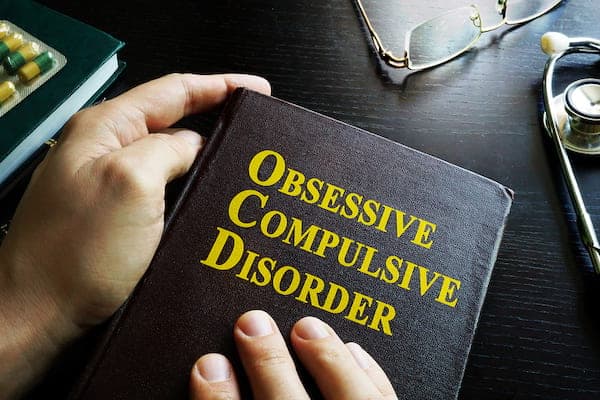Skip To Section
Obsessive-Compulsive Disorder, or OCD, is a mental health disorder characterized by recurring thoughts and compulsions that can significantly disrupt a person’s daily life. It affects approximately 2.3% of the global population, making it one of the most common mental disorders. Understanding what causes this disorder, its signs and symptoms, and available treatment options is crucial in helping individuals cope with and manage their OCD.

What Is OCD?
Obsessive compulsive disorder (OCD) is a mental health disorder involving recurrent and intrusive thoughts or images and repetitive behaviors. People with OCD experience exhausting, consistent symptoms called obsessions or compulsions. They sometimes include things like washing their hands or repeated checking of doors and lights. These symptoms can cause significant distress and interfere with daily life activities. They can be embarrassing and distracting. There is help with treatment for OCD.
What Are the Signs and Symptoms of OCD?
An overall descriptor of the symptoms of OCD is the unwanted, intrusive thoughts and recurrent behaviors that you feel the need to perform. OCD symptoms can appear in children, teenagers, and adults:
- Children with OCD may experience recurring fears and anxieties that cause them to engage in repetitive behaviors or rituals. These include counting, checking things several times, washing their hands often, or asking a lot of questions. They may also become focused on orderliness, symmetry, and cleanliness. Children with OCD may struggle to complete tasks or projects due to their anxious thoughts and feelings.
- OCD in teenagers often appears as intrusive thoughts about harm or danger. These thoughts can lead to worries, rituals, and extreme behaviors that have a pervasive effect on daily life. This could include avoiding certain situations due to fear, checking items for safety, or engaging in compulsive behaviors like arranging objects.
- In adults with OCD, symptoms may become more complex and intertwined with other anxiety disorders like panic disorder or social phobia. Adults’ obsessions and compulsions may not center around ritualistic behavior but instead focus on mental processes like excessive worrying about mistakes and other negative thinking.
The onset of obsessive-compulsive disorder can occur at any point in life, though it’s often diagnosed in young adulthood. It’s important to recognize the signs of OCD at any age so that you can seek obsessive-compulsive disorder treatment as soon as possible.
What Are Obsessions?
People with obsessive-compulsive disorder also experience intrusive thoughts or obsessions that are unwanted but difficult to control. These thoughts can range from fears of contamination or harm to others to worries about symmetry or perfectionism. They often lead to feelings of shame, guilt, and fear of losing control.
Those who struggle with OCD often feel compelled to perform their compulsions in response to their obsessive thoughts. While carrying out their compulsions may provide temporary relief from anxiety, it ultimately reinforces the cycle of obsession and compulsion.
What Are Compulsions?
Obsessive-compulsive disorder is different for everyone, but each person experiences some type of compulsion. A compulsion is a repeated behavior or ritual that a person feels the need to engage in, even if it doesn’t make logical sense. These compulsions can become overwhelming and interfere with daily life, causing distress and anxiety.
Common compulsions include:
- Excessive cleaning
- Excessive hand-washing
- Checking locks and appliances
- Counting or arranging items in a particular way
- Hoarding items
- Repeating words or phrases in your head or out loud
- Performing superstitious rituals like touching things a certain number of times
- Constantly seeking reassurance from others
While performing these tasks may offer slight relief from the urges caused by OCD, it’s a false sense of security. Doing them doesn’t solve the problem because they’re symptoms of it. Compulsive behavior can become so frequent and severe that it interferes with your daily life and activities.
What Causes OCD?
What causes OCD isn’t known. There are several theories about underlying OCD causes. Some evidence has suggested links between certain neurotransmitters like serotonin in the brain and OCD. Other research has suggested genetics may also play a role in developing this condition.
There is safe and effective treatment of obsessive compulsive disorder. Footprints to Recovery is a mental health and addiction treatment center. Our goal is to help everyone improve their lives. Treatment of OCD is one of the mental health issues our clinical therapists assist with. If you’ve never considered treatment for OCD, you may not know that treating OCD is possible.
How Is OCD Diagnosed?
OCD was once considered and diagnosed as an anxiety disorder. This is because of the large crossover between OCD and anxiety symptoms. Modern research has OCD classified as its own ailment with unique treatment.
The Diagnostic and Statistical Manual of Mental Disorders – Fifth Edition (DSM-5) by the American Psychiatric Association is the industry standard when it comes to diagnosing different forms of mental illness. According to the DSM-5, there are five related, but different types of OCD:
- Obsessive compulsive disorder (OCD) – A clinical disorder featuring compulsions and obsessions like washing your hands or counting things
- Hoarding disorder – Distress parting with items of little or no value
- Body dysmorphic disorder – Perceiving flaws in your physical appearance
- Trichotillomania – Constant pulling at hair, causing loss
- Excoriation disorder – Excessive picking at the skin, causing scabs and lesions
Diagnosing OCD starts with a consultation with a mental health professional. This evaluation may include interviews, physical exams, and other tests. The behavioral health professional will ask you questions about your past and current symptoms, any history of mental health problems in your family, and other relevant information. They may also ask about substance abuse. Many people who suffer from OCD turn to drugs and alcohol to self-medicate. Addiction can lead to odd or out-of-the-ordinary behavior. Sometimes that can be mistaken for OCD symptoms.
Based on this assessment, the healthcare professionals at Footprints to Recovery can make an accurate diagnosis and guide you on the best obsessive compulsive disorder treatment options.

Co-occurring OCD and Substance Abuse
Research from the National Library of Medicine shows that those with OCD are at a higher risk for substance use disorders. Effective treatment involves addressing both mental health and addiction issues at the same time. Since the two can intertwine and exacerbate one another, treating one without the other often means a higher chance of relapsing back into the cycle of addiction and mental illness.
There is no universal solution for everyone, but treatment should adapt as you progress in recovery. Footprints to Recovery offers levels of care to each client so they can find the path that best suits their needs.

How Is OCD Treated?
Treatment for obsessive-compulsive disorder typically involves a combination of therapy and medication. Cognitive-behavioral therapy, specifically exposure and response prevention, can help individuals learn to manage their compulsions and reduce the frequency and intensity of intrusive thoughts. Selective serotonin reuptake inhibitors (SSRIs) are commonly prescribed medications that can also be effective in treating OCD.
OCD Treatment Programs
The levels of care for addiction and mental health treatment we provide at Footprints to Recovery include:
- Medical detox – The first step in recovery from drug and alcohol addiction is medical detox. If you come to Footprints to Recovery with a dual diagnosis (both OCD and a substance use disorder), you will probably enter medical detox. The process rids the body of all substances under the care of a team of clinicians who help you manage withdrawal symptoms. Supervision can be crucial during detox as medical complications can arise if you quit alcohol or drugs cold turkey.
- Residential treatment – The most intensive level of care for obsessive compulsive disorder is residential treatment. You’ll spend 24/7 at our treatment facility undergoing counseling and therapies to address the root of your OCD and its symptoms.
- Partial hospitalization program – Our partial hospitalization program (PHP) is a step down from residential treatment. It involves living at home and spending around six hours at our facility, five days per week, undergoing treatment.
- Intensive outpatient program – Following PHP, the next level of care is an intensive outpatient program (IOP). This involves spending three to five days per week at our treatment center for a few hours each time. As you transition to less intense levels of care, the focus of treatment shifts to preparing you for life after OCD treatment.
- Outpatient rehab – Outpatient obsessive compulsive disorder treatment is the most flexible level of care. It involves visiting our treatment center once or twice per week for treatment. The goal of outpatient care is to ensure you have all the skills and tools necessary to handle mental health disorders or addiction in the future.
Obsessive Compulsive Disorder Treatment Services
Once you’ve consulted with a certified mental and behavioral health counselor and reached a diagnosis, treatment can begin. Treatment for OCD involves behavioral therapy and, in some cases, medication.
Medications for OCD
There are different types of medications used to treat OCD.
- Selective Serotonin Reuptake Inhibitors (SSRIs): SSRIs are often considered the first-line treatment for OCD. These medications work by increasing the levels of serotonin in the brain, which helps reduce symptoms of anxiety and obsessions. Some commonly prescribed SSRIs for OCD include fluoxetine (Prozac), sertraline (Zoloft), and paroxetine (Paxil).
- Serotonin-Norepinephrine Reuptake Inhibitors (SNRIs): SNRIs are another type of antidepressant that may be used to treat OCD. They work by increasing the levels of both serotonin and norepinephrine in the brain. Commonly prescribed SNRIs for OCD include venlafaxine (Effexor) and duloxetine (Cymbalta).
- Tricyclic Antidepressants: These medications were some of the first drugs used to treat OCD and are still sometimes prescribed today. Examples include clomipramine (Anafranil) and imipramine (Tofranil). They work by affecting levels of serotonin and norepinephrine in the brain.
- Antipsychotics: In some cases, antipsychotic medications may be prescribed to treat OCD symptoms. These drugs work by blocking dopamine receptors in the brain and can help reduce obsessive thoughts and compulsive behaviors.
- Anti-Anxiety Medications: Benzodiazepines*, such as clonazepam (Klonopin) and lorazepam (Ativan), may be prescribed to help reduce anxiety symptoms associated with OCD. These medications work by increasing the effects of a neurotransmitter called gamma-aminobutyric acid (GABA) which helps calm the brain.
It’s important to note that medication is not a cure for OCD, but rather can help manage symptoms. It may take several weeks or even months before the full effects of these medications are seen. It’s also important to work closely with a doctor to find the right medication and dosage for each case.
*Benzodiazepines are intended for the short-term treatment of severe anxiety disorders like OCD and insomnia due to their potential for abuse and addiction
Cognitive Behavioral Therapy for OCD
Behavioral therapy is another option for obsessive-compulsive disorder treatment. It comes in the form of individual therapy with a therapist and group therapy with other people suffering from OCD or other anxiety disorders.
Cognitive behavioral therapy (CBT) is a form of psychotherapy that focuses on identifying and changing negative patterns of thinking and behavior. Your thoughts, emotions, and behaviors are all connected. Changing thoughts and feelings leads to changes in behavior.
CBT is an effective treatment for many mental health conditions, including OCD. It focuses on recognizing negative patterns and challenging distorted beliefs. Then you can develop new coping strategies for triggers. Through a combination of cognitive restructuring, behavioral modification, and exposure therapy, you can confront your fears in a safe and supportive environment. You can learn how to manage your OCD symptoms without the mental health disorder so greatly affecting your life.
Exposure Therapy for OCD
Exposure therapy or exposure and response prevention (ERP) is an research-based mental health treatment for OCD. The goal of exposure therapy is to help you confront your fears and gain control over them, instead of avoiding or trying to manage anxiety through rituals or compulsions. With exposure therapy for OCD, you can not only reduce the fear, distress, and anxiety caused by a certain person, place, or thing, but also reduce the ritual (behavioral) response that comes as a result.
How Do I Pay for OCD Treatment?
One of the most common questions people ask their treatment counselors during a consultation is how to pay for obsessive compulsive disorder treatment. The most common way is through insurance. Footprints to Recovery accepts most major insurance providers. Every plan and policy is different. Speaking with our team can give you a better idea of what kind of insurance policy you have and the OCD treatments it will cover.
Contact Footprints to Recovery today and learn more about the types of OCD treatment available at our facility. Our approach to mental health disorder treatment is simple: We listen and cater treatment to your needs. Our team of dedicated, experienced, and compassionate clinicians strives to offer a safe, comfortable, and rewarding time in recovery for everyone who comes to us for help. Are you living with OCD and ready for a brighter future? Get started today!
- Obsessive-Compulsive Disorder in Children | Children’s Mental Health | CDC
- Obsessive-Compulsive Disorder: When Unwanted Thoughts or Repetitive Behaviors Take Over – National Institute of Mental Health (NIMH)
- Diagnostic and Statistical Manual of Mental Disorders (DSM-5®) | American Psychiatric Association
- Obsessive-Compulsive Disorder (OCD) – Harvard Health
- Axis I and II comorbidity in a large sample of patients with obsessive-compulsive disorder – PubMed
- Treating obsessive-compulsive disorder with exposure and response prevention.
Our admissions team is available 24/7 to listen to your story and help you get started with the next steps.


